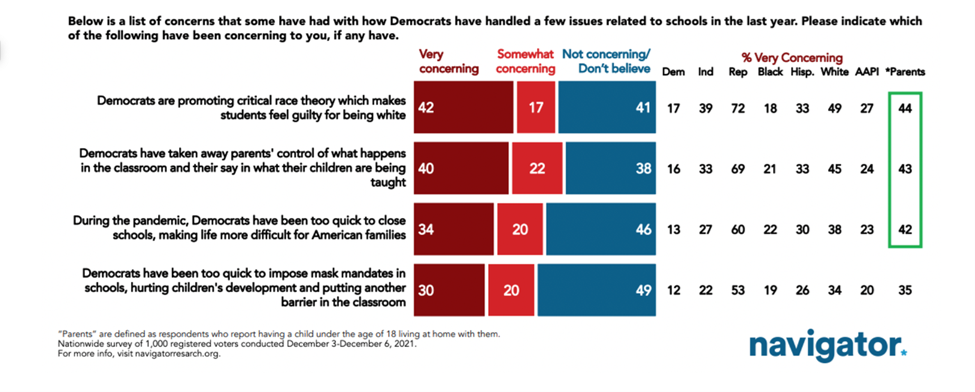The Daily Escape:

Siletz Bay, OR – January 2022 photo by Sanman Photography
The WaPo reports that House Republicans are putting together policies to run on in the 2022 mid-terms, and at the top of their list is tapping into parental discontent at how local schools are managed. They plan to focus on parental control of school curricula and school closures.
The new strategy is based upon last year’s gubernatorial race in Virginia, where Republican Glenn Youngkin won in a purple state by promising that parents would have more say in their children’s education. Younkin’s win was seen as a political earthquake by both Parties.
Now Republicans plan to use public education as a national political wedge issue. The strategy behind this is based on polling by the Democratic polling firm Anzalone Liszt Grove Research (ALGR) which gained prominence following Youngkin’s victory when they surveyed 500 Virginia voters. In an NYT article based on that poll, the Times stated:
“…polling showed that school disruptions were an important issue for swing voters who broke Republican—particularly suburban white women.”
Rachel M. Cohen, writing in The New Republic, says that the school closure issue may be overblown. But she thinks there are many other reasons for Democrats to be worried regarding schools.
Parents were frustrated about the fallout Covid visited on school-age kids. Many parents were forced to work from home or to leave the workforce to supervise their kids’ education, and to otherwise care for them when formerly, those kids would have been in school:
“But outside Twitter and op-ed pages, many surveys and studies have shown that actual parents and voters hold much more nuanced views. They can hate the harms of distance learning….They can express frustration with their circumstances but maintain that not all problems have…clear villains.”
While Democrats did poorer politically in 2020 than expected, it isn’t clear that it was because of school closures, as the questions surrounding schools changed almost on a weekly basis.
When kids returned to school in the fall of 2021, the Delta variant was circulating, kids were wearing masks, and individual classes were subject to rolling shutdowns after positive tests. However, the vast majority of children were physically back in school buildings full-time.
The University of Southern California’s Understanding America Survey surveyed parents four times during the pandemic: from October 2020 when 29% had fully in-person school, through October 2021 when 93% were in person. They found that parents’ concerns about their child’s learning declined significantly.
But public opinion shifted after the efforts by some on the Right to demonize the teaching of Critical Race Theory (CRT) which examines the history of institutional racism in America. Since last summer, we’re seeing a widening of the Republicans’ war on CRT. Republicans have passed legislation in Florida, Tennessee, Oklahoma, Iowa, Idaho, along with Texas and others, placing significant restrictions on what can be taught in public school classrooms, and in some cases, in public universities.
Republicans are saying they must protect students from CRT, but they can’t show examples of it actually being taught in schools. Once again, we’re seeing Conservatives pushing a concocted claim and the entire Republican Party playing along.
OTOH, Democrats must know that it’s impossible to win elections by telling voters that their concerns are imaginary.
In a nationwide poll conducted in early December 2021 by Global Strategy Group, researchers found just 13% of Democrats and 27% of independents described school closings as a “very concerning” issue compared to 60% of Republicans. However, slightly more Democrats and independents (17% and 39% respectively) were now saying that they were very concerned that Democrats were promoting Critical Race Theory in schools:

Opposition to CRT is now a proxy for the need for more parental input at schools. From Cohen:
“Mario Brossard, a senior research vice president at the Democratic polling firm Global Strategy Group, who conducted polling in October on CRT, told me, ‘It is clear that the discussion or the talking points around having parents have more input into the curriculum’ is being used as a euphemism for CRT. ‘The folks who are anti-CRT are fairly well entrenched, and they hold those sentiments quite strongly’…”
Again, Virginia showed Republicans the way forward. A Fox News voter analysis survey conducted by NORC polled over 2,500 Virginia voters right after the gubernatorial election. It found a stunning 72% of respondents said the debate over teaching CRT in schools was “an important” factor to them, with 25% calling it “the single most important” factor.
This is the basis for the Republican move to politicize how schools are administered. House Minority Leader Kevin McCarthy (R-CA) has released a “Parents Bill of Rights” that would create new mandates for school districts. They would require that districts post curriculum and school budgets, as well as lists of books in school libraries. McCarthy’s document asserts that parents have a “right to be heard.” School boards almost uniformly allow for public comment, though recently many across America have shut down meetings because of public disruptions and threats of violence.
According to the WaPo, Newt Gingrich is advising McCarthy on the issues that will resonate with voters in the November election. Just when you think things can’t get worse, Newt makes a comeback!
For Democrats, the 10 months until the mid-term should be enough time to make it clear to voters that parental input into how their schools are managed has always been a cornerstone of Democrats’ local politics.
But nothing will change the now-deeply ingrained distrust of local officials on the part of many Americans.
